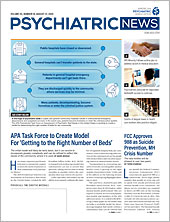The APA Psychotherapy Caucus is active on the national level with an annual meeting and a listserv hosting lively online discussions. It serves as a “big national tent,” welcoming psychotherapists from diverse theoretical backgrounds. The caucus is now working to create “big local tents,” psychotherapy committees at the district branch level, to promote more engagement and camaraderie as well as activities supporting psychotherapy practice by psychiatrists.
Prompted by a 2008 survey in Archives of General Psychiatry documenting the “significant decline in the provision of psychotherapy by psychiatrists in the United States,” the APA Board of Trustees approved a resource document in 2014, “Psychotherapy as an Essential Skill by Psychiatrists.” It states, “Psychiatrists are uniquely positioned to provide integrated treatment by providing medication alone, psychotherapy alone, or combined treatment.”
Unfortunately, practical financial and nonfinancial barriers perpetuate this decline, including the dearth of postresidency training, role models, and peer support. This significantly impedes our profession’s ability to deliver the comprehensive care for which we are uniquely trained.
Around the time the APA resource document was approved, a small group of psychiatrists formed the APA Caucus on Psychotherapy, with an inclusive mission: To bring together APA members committed to psychosocial treatment as part of psychiatrists’ training, skills, and identity under a “big tent” across theoretical traditions. Under the sequential leadership of Eric Plakun, M.D., David Mintz, M.D., and now Jeffery Smith, M.D., the psychotherapy caucus now has over 700 members, with work groups focusing on bringing psychotherapy back to psychiatry and bolstering psychotherapy by psychiatrists.
The caucus’s outreach work group is composed of the authors of this article—Margo Goldman, M.D., of the Massachusetts Psychiatric Society (MPS) and Seamus Bhatt-Mackin, M.D., and Margaret Tuttle, M.D., of the APA Psychotherapy Caucus Steering Committee—and Joe Wise, M.D., a past Steering Committee member. We aim to bring this national mission to the local level by establishing psychotherapy committees in APA district branches (DBs). We report here on two examples: An established DB psychotherapy committee in the MPS and an emerging DB psychotherapy committee in the North Carolina Psychiatric Association (NCPA).
The MPS established its Psychotherapy Committee in 2014. Members represented a range of theoretical orientations and levels of experience, including residents. The committee has (1) organized annual psychotherapy CME conferences presented by expert psychiatrists practicing psychotherapy; (2) developed and maintained a database of postresidency psychotherapy training and educational resources; (3) encouraged residents and early career psychiatrists (ECPs) to practice psychotherapy; and (4) explored advocacy within our profession—for example, engaging residency programs to promote psychotherapeutic treatment as integral for all practicing psychiatrists.
To date, the committee’s six CME conferences have built a sense of community among psychiatrist psychotherapists and attracted psychiatrists wishing to learn more about psychotherapy. The committee will further build this community by working to arrange psychotherapy supervision and mentoring for ECPs. There are enormous potential benefits for patients, individual clinicians, the profession, and organized psychiatry (see box).
Inspired by the established psychotherapist-psychiatrist community in Massachusetts and hungry for something similar, APA members in North Carolina have started to mobilize. NCPA Executive Director Robin Huffman and NCPA President Zachary Feldman, M.D., support the formation of this committee and the emerging momentum.
Like the caucus and the MPS committee, the NCPA psychotherapy committee will take a “big local tent” approach by welcoming psychiatrists with a range of theoretical approaches, work settings, and career stages. Plans for the committee include (1) collecting information about psychotherapy and disseminating it to NCPA members and organizations committed to psychotherapy by psychiatrists, (2) proposing psychotherapy-related presentations for the NCPA annual meeting, (3) bolstering training of psychiatry residents interested in psychotherapy, and (4) exploring avenues for advocacy within and outside the profession.
The APA caucus leadership strongly supports establishing local psychotherapy committees to expand the practice of psychotherapy by psychiatrists, using the Massachusetts and North Carolina experiences as inspiration and models. These DB committees—“big local tents”—can become gathering places for psychotherapy-inclined psychiatrists. The caucus urges psychiatrists across the country to promote psychotherapy committees within their DBs. Accomplishing this mission will help empower psychiatrists to practice “at the top of our license,” providing the full range of treatment for which we are distinctively trained. ■
To contact the authors of this article to discuss specific strategies for starting a psychotherapy committee at your DB, please email
[email protected].
To join the APA Psychotherapy Caucus, sign in on the
APA website and go to “My Profile.” On the left menu, select “Specialty Interests Caucuses and Listservs.” On the new page, check “Psychotherapy,” and you will automatically become a member and receive announcements.
The APA resource document “Psychotherapy as an Essential Skill by Psychiatrists” is posted
here.

